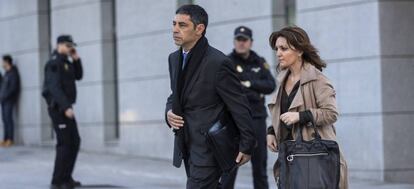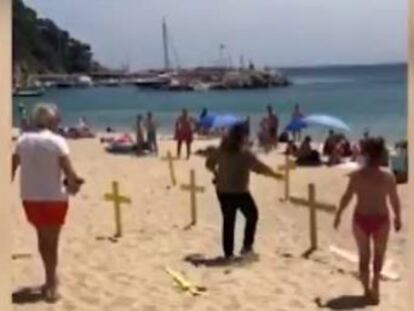Former Catalan police chief to be tried for sedition
Josep Lluís Trapero and other ex-officials will sit in the dock over their role in the referendum and protests leading up to it


The case against the former head of the Catalan police, Josep Lluís Trapero, is ready for trial. The ex-chief of the Mossos d’Esquadra, as the regional force is known, will be tried for sedition and criminal organization in connection with the illegal independence referendum of October 1 and the events running up to it.
Investigating Judge Carmen Lamela of Spain’s High Court, the Audiencia Nacional, also stated that ex-Mossos director Pere Soler and César Puig, ex-general secretary of the regional interior department, will be tried for the same offenses.
The Mossos “limited themselves to pretending that it was impossible to follow orders”
The decision brings an end to the investigative stage of a judicial probe into the role of the Mossos in the secessionist drive, which culminated on October 27 with a unilateral declaration of independence in the regional parliament, prompting the central government in Madrid to invoke Article 155 of the Spanish Constitution and suspend the region’s autonomous powers.
The case will now move to the High Court’s Criminal Division for judgment.
On April 5, Lamela charged Trapero with criminal organization and two counts of sedition over his role in the protests on September 20 and 21 and the illegal independence referendum on October 1.
The September protests took place outside the Barcelona building that houses the Catalan government’s department of economic affairs, where the Mossos allegedly stood by while pro-independence crowds obstructed a raid inside the building. There were also acts of vandalism against Civil Guard patrol cars.
According to the April 5 charges, the Mossos “limited themselves to pretending it was impossible to follow orders given the tumult of people congregated around the building, when in fact it was an open refusal to the repeated requests for assistance that they received from the Civil Guard […].”
Soler and Puig were also charged with criminal organization and sedition for their role in the referendum, as was Mossos superintendent Teresa Laplana for her actions during the September protests.
In the case of the October 1 referendum, Lamela wrote that the Mossos chiefs activated a plan to avoid acting against the vote despite a court order to do so.
Lamela considered that Trapero, Soler and Puig were part of a hierarchical organization
Lamela considered that Trapero, Soler and Puig were part of a hierarchical organization “under common guidance, at the top of which was the premier of the Catalan government.” The latter is a reference to former Catalan premier Carles Puigdemont, who was sacked by the central government under Article 155 of the Constitution and is currently in Germany awaiting possible extradition to Spain.
This “stable structure,” according to the judge, had the characteristics of a criminal organization: it was hierarchical, permanent and shared out defined roles and responsibilities.
In the case of the referendum, the former Mossos chiefs did not only fail to follow orders, but also actively supported the separatists by tipping them off to how police were planning to enter the voting stations, said Lamela.
English version by Melissa Kitson.









































